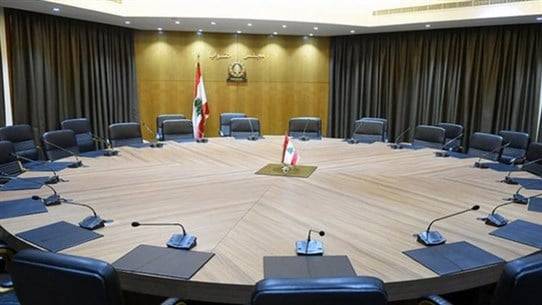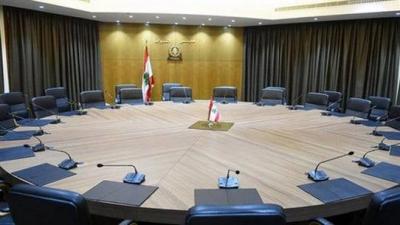President Michel Aoun's stance, considering that the dialogue called for by Speaker Nabih Berri regarding the presidential issue will fail, surprised both his allies and adversaries, especially since his son-in-law Gibran Bassil, head of the "Free Patriotic Movement," had announced that they would approach Berri's dialogue initiative positively in principle. The "Movement" had launched a presidential initiative based on dialogue to agree on a president for the country.
Aoun stated, "Speaker Nabih Berri has the right to consult with the parliamentary blocs, but not to call for dialogue," adding, "Even if my presidential term ends, he should not take the place of the President of the Republic, and the dialogue regarding the presidential issue will fail, but consultation might lead to results since it is a dialogue between two people, while the group does not negotiate as a whole."
Berri had previously announced, through "Asharq Al-Awsat," that he would not call for new sessions soon to elect a president, as they had become a "failed play, with no purpose," and he would attempt to replace it with a dialogue among the political forces, revealing that he had started sending representatives to the political forces to gauge their opinions on this matter.
After three failed sessions to elect a president due to the parliamentary setup of current minorities and the lack of a majority capable of imposing a desired president, many voices have risen calling for dialogue and agreement on a name for the presidency, especially since it is confirmed that the country will enter a presidential vacuum next Monday, with Aoun's term ending.
Sources close to Berri told "Asharq Al-Awsat" that he would activate his movement concerning the dialogue call next week after Aoun's term ends, rejecting any anticipation of official responses from parties and blocs based on some media positions. Informed sources closely observing the ongoing communications regarding the presidential file do not rule out Berri reevaluating the nature of the dialogue he intends to call, making it different from the dialogue table called in 2006, where representatives from the main parties participated, particularly following Aoun's stance and that of Forces Party leader Samir Geagea, who does not seem enthusiastic about such dialogue.
During a press conference held yesterday, Geagea stated, "Constitutions are set to be applied, and the quorum is established to complete the presidential election process, while what is happening is a circumvention; I would prefer Berri to invite the deputies who are boycotting the election sessions to attend and vote for whom they want." He added, "Out of fear of any additional attempts to disrupt, we respond to Berri's invitation, but within the context of a presidential election session, and we propose he calls for an election session as soon as possible, and within this session, the blocs can discuss among themselves, and the session should not end before electing the president, so that we remain faithful to the constitution and the presidential entitlement."
For his part, Progressive Socialist Party MP Bilal Abdullah emphasized that "the call for dialogue cannot be a substitute for the call for election sessions, but rather they should proceed in parallel; because the purpose of dialogue is to facilitate the aim of election sessions and to find common ground and rapprochement between different parties." He stated to "Asharq Al-Awsat": "We are waiting for an official invitation from Speaker Berri to base our actions on it, noting that we, as a Democratic Encounter, are positive towards all of Berri's proposals because we know their national background. The details of the nature of the invitation and the topics we will discuss will remain within the Democratic Encounter with Progressive Socialist Party leader Walid Jumblatt."
"National Moderation Bloc" member MP Ahmad Al-Khair affirmed their readiness for dialogue, "provided that the discussion is confined to the presidential elections." He clarified, in a statement to "Asharq Al-Awsat," that the details of the invitation, once directed, will be discussed thoroughly within the bloc.
Meanwhile, MP Elias Hankach from the Kataeb Party stated that his party is entirely in favor of dialogue among conflicting parties, especially concerning a fundamental entitlement like the presidential election, pointing out that they have decided to participate in the dialogue Berri will call for, stressing that it must be limited to the presidential file. He indicated, in a statement to "Asharq Al-Awsat," that "any attempt to advance the presidential issue is supported, but we wish it would occur within constitutional institutions, and any call for dialogue has its components to be productive."
He added, "There is no doubt that the other team continues to seek to impose its decision and control over the presidency and other matters, but it equally understands that the parliamentary scene is no longer as it used to be, and there are minorities interacting within the council with no overall controlling team. Hence, dialogue among various components could be productive if intentions are sincere, and not simply a waste of time waiting for external interventions; otherwise, we will not accept that because we should be up to the level of the crisis afflicting the country."
For his part, member of the "Changing MPs" bloc, Mark Daou, considered that "organizing dialogue is beneficial to activate parliamentary life and could possibly occur through general discussion sessions in the council," noting, in a statement to "Asharq Al-Awsat," that "this entitlement is a turning point in the process of reconstituting authority after the October 17 revolution, which in itself is an entry point for a real transformation in the Lebanese political scene."




